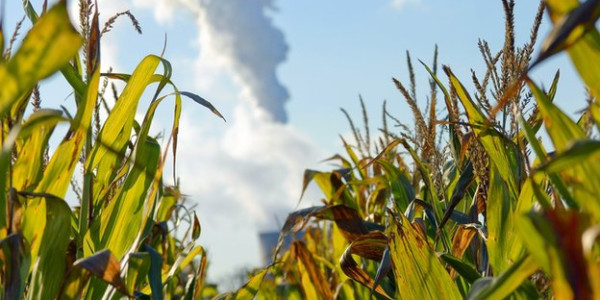Taylor Scott International News
By Simon Redfern Reporter, BBC News Growing maize for use as a biofuel is controversial as it can impact food prices US researchers have used genetically modified yeast to enhance the production of biofuels from waste materials. The new method solves some of the problems in using waste like straw to make bioethanol fuel. The scientists involved say the development could help overcome reservations about using land for fuel production. The research is published in the journal Nature Communications. Many states around the world have plans to replace gasoline with bioethanol, but this has typically been by changing land-use from food crops to biofuel. Just this week, a representative of South Africa’s farming community announced that sorghum harvests would need to increase five fold to meet their government’s commitment to incorporate at least 2% bioethanol in petrol. Sorghum is South Africa’s second biggest summer crop and is a staple food as well as being used in brewing and livestock feed. However, scientists are now seeking more sustainable routes to generating biofuel – routes that would have a lighter impact on food prices and production. Breakdown breakthrough One is to consider using non-conventional plants such as seaweed. But among the most radical ideas is the suggestion that biowastes should be used to produce bioethanol, which is added to petrol replacing some fossil fuel. “Wastes present a major opportunity in this respect. We have to start to think about wastes, such as sewage or landfill waste as resources – not problems to be disposed of,” Dr Gavin Collins, an environmental microbiologist at the National University of Ireland, Galway, told BBC News. Using microbes to make fuel from biomass involves breaking down large complex biopolymer molecules. These are indigestible to most bugs, and attempts to incorporate them into fuel production have slowed down the biotechnology, creating bottlenecks. Biofuel boom The European Union also has a declared aim that 10% of its transport energy should be from renewable sources, such as biofuels, by 2020. To help meet this target, Europe’s largest biofuel plant opened this week at Crescentino, Italy. It is designed to generate 75 million litres of ethanol a year from straw and a crop called Arundo donax, which can be grown on marginal land, and does not compete for resources with food. One chemical that is produced when processing biowastes is a large sugar molecule called xylose. When you try and use yeast to ferment xylose, rather than making alcohol for fuel directly, it generates acetic acid – essentially vinegar. This is poisonous to the yeast, and stops the fermentation. Breaking down xylose and making acetic acid non-toxic are the two major problems that must be solved if biowastes such as straw are to be fermented to make fuel. Now, US biotechnologists appear to have solved both problems, by developing a genetically engineered strain of yeast that simultaneously breaks down xylose and converts acetic acid to fuel. “Xylose is a sugar; we can engineer yeast to ferment xylose,” said University of Illinois Prof Yong-Su Jin, one of the authors of the study. “However, acetic acid is a toxic compound that kills yeast. That is one of the biggest problems in cellulosic ethanol production.” The yeast digests the sugars in oxygen-poor conditions, making the process more efficient than digesters that rely on active mixing of air into the system. Microbe driven A new pathway, not yet discovered in nature, has been genetically engineered in the lab. This breakthrough means yeasts can be used much more efficiently to convert biowaste into biofuel. “We sort of rebuilt how yeast uses carbon,” said principal investigator Dr Jamie Cate, of the University of California at Berkeley One hurdle to implementing the discovery is that the new yeast that has been developed is genetically modified, and it is not yet clear how easily GM yeasts might be accepted for use on an industrial scale. Dr Gavin Collins, however, remains upbeat about the prospects for biotechnology. “We probably know the function of only about 0.01% of all living microbes on Earth,” he said. “It may be that many of them can efficiently degrade even complex plant material and other wastes under anaerobic conditions. They may be present in nature but we haven’t found them yet. “However, just look at what we have been able to do with the small fraction of microbes we understand – everything from antibiotic production; food and alcohol production; and biofuel production. “Just think what we could do, or what we might discover, if we understood the function of just another 1%.” Taylor Scott International
Taylor Scott International, Taylor Scott








